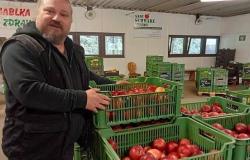Collection of organic waste. Photo: archive
Statistics prove that more and more Prague residents are sorting organic waste. Last year, they stored almost 15,300 tons of bio-waste in brown containers. PSAS expect this number to be slightly higher again this year. “We have already distributed over forty thousand special bins for organic waste to people. We are pleased with their interest. More ignited sorters means a greater amount of plant residues from gardens and kitchens in the right container,” said company spokesperson Alexandr Komarnický.
Residents of the metropolis can still set up bio-waste collection, they have a choice of two options. The first is seasonal, which started on March 25 this year and will end at the beginning of winter. It is suitable for gardeners and is currently used by roughly 60 percent of brown bin owners. The second option is year-round collection. “We recommend it mainly to households in apartment buildings with stable production of vegetable bio-waste throughout the year. At the same time, we remind you that those who pay fees for a black mixed bin get the brown one for free,” the spokesperson continued.
Beware of unnecessary sorting errors
When sorting, it is important not to mix the fifth through the ninth. Bio-waste includes only plant residues. Leaves, grass, weeds, twigs, plants, remains of fruit, vegetables and the like. PSAS strongly appeals that people do not throw bread, eggs, bones, dairy products, meat, or any packaging and bags into the organic waste. “Please note that even pet litter does not belong here, as it can be contaminated with pathogens and parasites, which will invalidate the contents of the entire container,” pointed out Komarnický. Bio-waste bins are subject to different rules than private compost.
In addition to the classic brown containers, the capital also provides large-volume bio-waste containers for citizens. In them, they can put what does not fit in the bins – a large amount of leaves, grass, branches from trees and so on. The date and location of the BIO VOK can be easily found on the municipal website https://ksnko.praha.eu/map-bulky/.
Well-sorted organic waste will serve city parks in the form of compost. Plant residues are transported by Prague services to compost plants. In contrast, in biogas stations, gastro waste from the HORECA sector, as well as the contents of brown bins with an orange lid for kitchen scraps, can be used.
Their collection is now taking place in a test mode in the east of the metropolis. These containers include all remains of animal origin from the kitchen, as well as, for example, fruit and vegetables, expired food even in its original packaging (except for glass), everything always wrapped in any type of bag.
“Prague literally has a mine of ‘dirty gold’. We want to make the capital a champion in the use of bio-waste and gastro-waste. Experience from other European cities shows that it is possible to sort out almost everything. And that’s where we’re heading,” said Jana Komrsková (Pirates), councilor for the environment and climate plan.
With some exceptions, the people of Prague currently throw kitchen scraps into the black bin for mixed waste. In the future, the city could use this valuable material as part of general collection, for example for energy production.
Number of brown bins for organic waste in Prague:
40,657
Amount of sorted organic waste from citizens in collection containers in Prague:
2020: 4,995 tons
2021: 6,435 tons
2022: 12,846 tons
2023: 15,265 tons
Bio-waste includes:
Plant waste only. For example, grass, leaves, fruit and vegetable scraps, tea bags, coffee grounds, plant scraps, potting soil, weeds, sod with soil, brushwood, wood shavings, sawdust, shavings, bark, hay and straw.
Bio-waste does not include:
No types of bags or packaging materials. Also bones, skin, oils, fats, dairy products, pet litter, animal excrement, feathers, hair, hair, dead animals, contaminated sawdust or contaminated shavings or bark.
Source: PSAS






